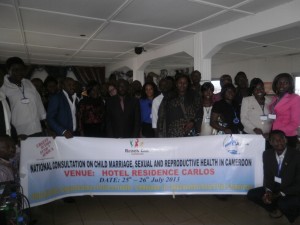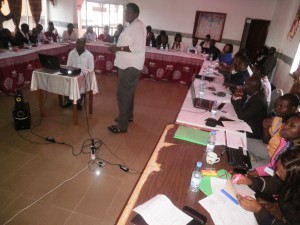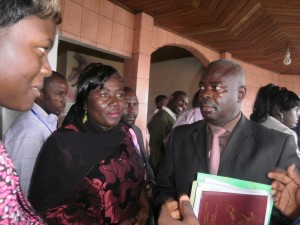By Walter Wilson Nana
Buea, Cameroon.
There is a global partnership to end child marriage and so the Cameroonian youths are not left out in the fight.
Motivated to make a contribution, the Organisation of African Youth, OAYouth, Reach Out Cameroon and Urgent Action Fund For Africa, recently, held a national consultation on child marriage, sexual and reproductive health in Buea, Cameroon.
According to the convener of the national consultation, Jude Thaddeus Njikem of OAYouth, the meeting with development partners, members of parliament and female senators is to examine the issues of child marriage in Cameroon as well as sexual and reproductive rights of young people.
He said there is need for young people to take ownership in seeking solutions to ending child marriage and improving sexual and reproductive health of young people, especially girls, through constructive participation and organisation.
Njikem said child marriage is the practice of marrying children before attaining the age of 18, adding that demographically, the world is facing its largest-ever youth generation with over a billion young people between the ages of 10 – 19 and 84 percent of them living in developing countries. “With this statistics, it is estimated that more than a hundred million girls in the developing world would be married in the next decade,” he mentioned.
The OAYouth Executive noted that child marriage is common in Cameroon, citing the Northern Regions; Far North, North and Adamawa respectively, with a prevalence of 73 percent, the East Region with 60 percent and the South and West Regions respectively having 30 percent prevalence of child marriage.
Helen Namondo Fontebo, Lecturer in the Department of Women and Gender Studies, WGS, University of Buea, UB, corroborated Njikem, saying child marriage is a reality in Cameroon, while citing cases in the Northern part of Cameroon and a deplorable situation of a 78-year-old man, getting married to a girl of 14. To her, it is contrary to the laws of Cameroon and the UN, which put marriage for female at 18.
The UB lecturer saw in child marriage a human rights violation because the consent of the girl child is not sought. Some other consequences she enumerated include; adolescence and schooling cut short, early pregnancies, hazardous births, obstetric fistula, domestic violence, exposure to HIV/AIDS, STIs and more.
On how to redress the issues, Fontebo advised that there should be a change of attitude, mass media coverage, the essence to vote laws that prohibit child marriage, collaboration with traditional rulers, school authorities and researchers.
Nina Tchangoue, member of the Youth Advocacy group in the UN Global Education First Initiative said it is time for young people to remain hopeful and believe that they can influence, initiate dialogue within the youth, government, civil society organisations, development partners, UN bodies and other stakeholders on child marriage. “Let young people share the discussions out of this consultation and continue the whistle blowing,” she noted.
Peeters Fongeh of Vision Action Cameroon said some best practices should be followed in the fight against child marriage. These include; rights to health issues, access to reproductive health services, sexual health and rights, the respect of commitments that governments have made in international conferences and world summits, the MDGs, the enactment of positive laws and policies and the revision of laws that are not favourable to the development and evolution of the girl child and women.
According to a report by Girls Not Brides, an international initiative to combat child marriages; “The needs and rights of adolescent girls have been largely overlooked in the MDGs. This must be rectified in any post-2015 development framework. The continued existence of child marriage around the world is a symptom of this lack of attention and the practice has directly hindered the achievement of 6 of the 8 MDGs.”






